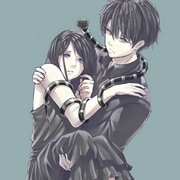Esfandar looked down into the well. The water was dark and muddled, but not because of the usual grime that came with being in the center of a filthy and overflowing city. The water had a yellowish tinge to it, the same sickly shade as dog piss.
Esfandar ground his teeth together in agitation as he surveyed the site. It was the fourth poisoned well in as many weeks, and his patience was wearing thin. The first he had dismissed as a petty crime, the result of some local feud. After the second poisoning, however, it became clear that there was more at work here.
Esfandar’s alchemists had identified the poison as diamond-back venom. The serpents of the swamp were rare enough that such a widespread poisoning was even more highly suspicious.
The first three poisoned wells had been in back alleys and quiet roads, but this one was in the middle of the Bazaar square, one of the largest thoroughfares in Shiraz. It would be more than a small annoyance.
Esfandar raised his head and looked around at the bustling square. It wasn’t a market day, but even still the street was crowded with people going about their business. Men hawked gold and silver bangles to pretty young women and children laughed at strange birds that could speak back to them.
But there was a heavy feeling in the air as well. The feeling of a city captured and occupied, full of citizens resentful of their new ruler.
Esfandar had treated the people of Shiraz fairly, as fair as was possible. Those who had died defending their city had been buried honorably. Tarsim Aspabadh, the former lord of the city, had died fighting. The man’s family and any other members of House Aspabadh remaining in the city had wisely fled when it had become clear that Shiraz would fall. They were probably half way back to Nishapur by now, ready to kiss the feet of Roshani and provide her with fresh tales of his cruelty and arrogance.
Esfandar sighed. He gestured to one of his men, who came forward with a sack filled with coins. He walked forward to a bent, graying man dressed in battered but solid cloths- the wellkeeper. He placed the sack of coins in the man’s hands. The old man seemed to struggle to hold the weight of it.
“For your trouble,” Esfandar told him. “We will find the criminals. I swear it.”
The man looked up from the coins. His face was lined with wrinkles, but his eyes were as clear as the morning sky, a dark, earthy brown. They held no gratitude. They were defiant eyes.
Esfandar strode away from the man and back amongst his ranks before there was a chance for the situation to escalate. He had to tread carefully. He could not afford a revolt, not now.
Esfandar had been fair with city council that had been all that remained of Shiraz’s leadership. He had given them an ultimatum: serve him, or die. Their choice had been unanimous.
Yaza Benatim, one such councilor, approached him now, his dark head bent in reverence.
“Your majesty, business in the bazaar will suffer if the well is not fixed soon.” Yaza’s voice was smooth and easy- a voice used to having sway. His thin neck was strung with rings of jewels and gold, over a patterned tunic.
Esfandar turned to him.
“I don’t intend to let the people of Shiraz suffer for this criminal’s act,” He said. “Although a solution will take time.” He raised a hand and waved forward two of his lieutenants, from his corps of engineers. “Have your unit fill in this well immediately,” Esfandar ordered. “It’s worth nothing now. Have a second unit select an ideal spot for the new well and begin construction as soon as possible.”
“Yes, your highness,” the soldiers replied, inclining their heads and moving to give their men his instructions.
Yaza smiled stiffly and bowed in a supposed act of graciousness.
Esfandar took one last glance about the square. Most commoners avoided his gaze. But there were some like the old wellkeeper- hostile, rebellious. Eyes that did not like what they saw.
Esfandar squared his shoulders and turned around. His men filed around him, forming ranks as they escorted him through the streets of the city and back to the fortress. He walked with a fast pace, eager to return. Right now, he needed advice. He needed Gita and Karim.
The streets of Shiraz were narrow and dirty, rivulets of filthy water streaming into crowded gutters. By now, the remnants of the battle for the city were almost completely washed away- that day the small streams in the gutters had been red with blood.
Shiraz was not a large city, but it took longer than it should have to reach the castle. The streets were all winding and twisting without any common sense, weaving under and over and through the stone buildings and walls that rose up around them. Karim had explained that it had been built that way merely out of necessity- the first people of the city had built streets as they needed them, turning one way when it was convenient, and twisting back around when it was not. The people of Shiraz knew every alley and crevice of the streets and knew them well, but for newcomers the passageways were as foreign as the lands across the great sea.
Esfandar and his men turned one corner to see a fairly large crowd of people gathered around a square. In the center, a short animated man spoke fervently, waving his arms towards the sky as the crowd listened.
“Mithra’s gaze has fallen to the mortal realm,” he was saying. “And it has smiled down upon the flame walker- the one blessed by the gods!”
It was clear that the man was a priest by the dull colors and simplicity of his robes. Interestingly, his garb included a single necklace of silver strewn about his neck. Usually priests of Mithra eschewed all ostentation and jewelry. He wondered why this one was different.
As if sensing Esfandar’s gaze, the priest stopped talking and turned to look at him. The entire crowd stopped, noticing the presence of imperial soldiers, and glared as they made their way by. Esfandar held the priest’s gaze for a moment before they turned another corner and the priest and his people were lost to sight.
“Priests of the Arani order, your highness,” Babak murmured to him as they continued to weave their way through the streets. “They’ve been stirring up trouble as of late- preaching in support of Soraya, riling up the city’s people in her favor.” A group of merchants selling overripe melons and wilted cabbages grew silent as Esfandar and his group of soldiers passed them by. “Something must be done about them sooner or later.”
“Of course,” Esfandar replied with a nod. Inside, he groaned to himself. Another problem added onto the ever-growing list. As if there wasn’t enough to deal with without a group of rebellious priests. However, Babak was right- their treacherous preaching could not be allowed to continue in the city.
He and his soldiers continued to navigate through the winding city streets. Everywhere they went, people grew silent and subtle glares were sent their way, but no one gave them any more trouble.
Once returned to the fortress, Esfandar dismissed most of his guard and strode towards the room that he had adopted as his private meeting chamber and study. It was a good room for such private matters of governance, a desk and shelves of scrolls neatly in one corner while several red and yellow sofas were spaced evenly in the center of the chamber.
Yaza and a few other men followed him into the room. Esfandar sat upon one of the sofas, a bright saffron yellow divan with gold trimmed pillows. His body suddenly felt very tired, his eyes heavy with exhaustion. The pillow and sofa looked unimaginably inviting.
“Leave me,” He commanded them. “And summon Gita and Karim.”
The men bowed low to him and left to do his bidding, Yaza bowing lower and more vivaciously than all the others. The heavy wooden door slammed shut.
He was completely alone in the room. It was such a rare occurrence these days, he hardly knew what to do with himself. Esfandar walked to a small table laden with food and drink that the servants must have set up, anticipating his return. He ravenously devoured the flat bread, dates, and cheese laid out on the enameled platter and poured himself a full cup of the wine.
He tried to think back to the last time he had had such time to himself and failed to recall it. Either he was surveying his armies or some urgent need in the city or he was deep in discussion with generals, advisors, and councilors. Even when he bathed, servants stayed at the door to tend to him, and guards were always just beyond the door when he slept. Not that he got much sleep these days, either.
Gita and Karim found him reclining on the sofa with wine in hand when they entered. Karim merely sighed at him as he moved to pour his own cup and take a seat. Gita didn’t frown or scold, but her eyes made clear her disapproval. She had the most expressive eyes he’d ever seen. He swore she could have whole conversations without speaking a word.
“Another poisoned well,” Esfandar said, though Karim and Gita had surely already heard by now. “And still no evidence of who’s been poisoning them.”
Karim sighed in contentment and sat on the couch across from him.
“An excellent wine,” he said, happily taking another sip.
Esfandar swirled the dregs of his own drink in his cup. “It’s the only wine that can be made in these desolate plains. Hardly the best.”
Karim shrugged and downed the rest of his glass. “When you’ve been raised in the slums of Nishapur, all wine is excellent,” he said wiping the edge of his mouth with a sleeve.
Looking upon Karim now it was hard to remember his humble beginnings. His soft brown hair hung evenly about his shoulders, and his ears were heavy with the weight of two fat emeralds. His clothing was equally ostentatious, a simple but beautiful green and gold embroidered kaftan and a dark green scarf hanging fashionably about his neck. Esfandar doubted he would have recognized his friend now in his old gutter clothes. He’d completely assimilated to the Parthian nobility’s ways and habits since joining the army.
Gita rolled her dark eyes and placed an idle hand on the hilt of a knife. She withdrew the blade, leaned forward, and stabbed a piece of meat with it. She ate the morsel in one bite, chewing contentedly.
“I’ll station my troops around the remaining major wells in the city,” she said after swallowing. “No one will come or go without our notice.”
Karim barked out an incredulous laugh and Gita cut her sharp gaze to him.
“That’s exactly what you shouldn’t do, Esfandar,” he warned. “Not unless you want a revolt on your hands. The people of this city are already resentful of our presence here. Don’t give them the excuse to act on it.”
Karim was right, though Esfandar still longed to set up perimeters around the city’s wells and be done with it. He ran a hand through his hair and sighed in frustration. It infuriated him that the well poisoners should be allowed to continue their crime so easily. But he had to be smart about this.
“Send one or two men to keep an eye on each of the wells,” He said reluctantly. “They should dress as commoners and try to keep out of sight. They could still miss the poisoners, but it’s the best we can do.”
“Of course.” Gita’s eyes spoke once again where her words remained few: It will be done. You can trust me.
Esfandar nodded and broke her stare to pour himself another cup of wine.
Where Karim had quickly and eagerly assimilated to the Parthian upper-class, Gita had stubbornly remained unchanged. She still wore her tribal battle clothes, insisting they were better than the cumbersome metal and chainmail that Esfandar’s regular soldiers wore. Her leather jerkin was only a shade darker than her skin and fit her form exactly, and she always wore the same loose, boar hide trousers. Various bracelets of different colors and beads were wrapped around her upper shoulders and forearms. Esfandar had once tried to pry out their meanings from her but she’d remained predictably elusive. Still, she seemed to value them more than any gold or silver pieces.
Her black hair remained braided down her back, no matter how many servants tried to untie it. And of course, her myriad blades remained faithfully tucked into the belt at her waist. Esfandar was long past the point of being wary of those daggers- if she had really wanted to kill him, she would have done it long ago.
“But Es,” Karim said, his voice growing serious. “You will have to take some precaution.” He adjusted his dark green scarf. “Soraya will hear of this sooner rather than later. And that’s if she hasn’t orchestrated the entire plot herself.”
Esfandar turned his face away from Karim, looking out the wide windows. He knew it did nothing to hide the pain and anger, but old habits died hard.
He remembered the utter despair and rage when the news had come of Roshani’s betrayal. It had nearly destroyed him, but he knew Roshani, and he knew what she had been capable of. If it had been a surprise to him then, it had made sense to him after the fact.
Soraya, though, he still couldn’t figure out why she had decided to betray him as well. When the messenger had come to announce that Soraya had escaped the coup in the capital, he had wanted to give the man a fortune for his reward. When he had haltingly continued that Soraya had set up her own capital in Azar-Atash, his joy had been followed by confusion, then immense hurt and rage.
He had expected her to come to his camp immediately. Because he would have protected her, because together they would have had the best possible chance against Roshani. Because he was her brother.
He eventually concluded that it could only be those priests whispering in her ear. He wouldn’t have thought it possible. Soraya was the most intelligent and observant out of all of them. How could she let herself be manipulated to such an extent? But circumstances changed. People changed. Perhaps he would never know the reasons why. Now he could only fight her, fight both of them, and win.
“We’ll find whoever it is poisoning these wells,” Esfandar said at last. He hoped that his voice sounded more confident than he felt. “And if Soraya is behind it, then we’ll simply have to make our own retaliation.”











Comments (0)
See all